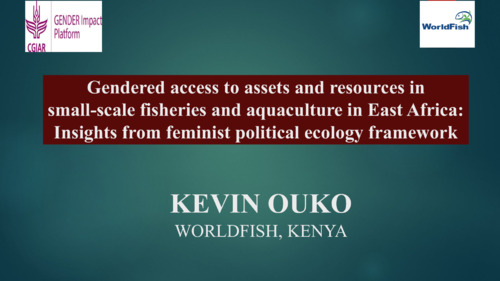Gendered access to assets and resources in small-scale fisheries and aquaculture in East Africa: Insights from feminist political ecology framework
Abstract
Participation in small-scale fisheries and aquaculture has assumed a gendered approach, with men predominating resource and asset ownership. Despite their growing food provisioning responsibilities, women’s traditional reproductive tasks and inheritance roles appear to explain their limited resources and asset ownership or lack thereof. This productive resource and asset position is underpinned by power dynamics steeped in the sociocultural setting. This study aimed at understanding how unequal resource and asset disposition influence men’s and women’s participation in the sector in East Africa. Using a feminist political ecology framework, this study explored intersecting resource and asset inequality and power imbalance to demonstrate the impact of gendered resource and asset access in fisheries and aquaculture development. The study applied a systematic literature review to identify 18 studies published between 2017 and 2023 in selected electronic databases including Google Scholar, Scopus, Science Direct and JSTOR. Findings revealed that fisheries and aquaculture are resource-intensive, with social, cultural and gender ideologies contributing to gendered participation. In light of the prevailing food insecurity situation in the region and the unprecedented feminization of fisheries and aquaculture value chains, the study concludes that women’s role in small-scale fisheries and aquaculture value chains can grow if gender disparities and power imbalance in asset and resource ownership are advanced. It thus recommends a reconceptualization of the role and identities of women in aligning with the complex food insecurity realities within the fisheries and aquaculture value chains. Moreover, findings signal that multidisciplinary research is needed to further enhance knowledge. Researchers may benefit from this study by taking a glance at past studies and exploring the unmapped research projects for the future.

